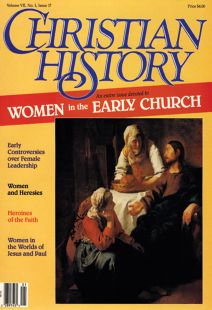Women in the Early Church: From the Publisher
THE QUESTIONNAIRE we sent out recently drew an enormous response. Your counsel is most valuable. You gave us a number of good ideas for specific improvements to the magazine, which we will be implementing in the next few issues (for example, in this issue, at your request, we have expanded the bibliography to include brief comments on the books cited).
Your comments also showed that the overwhelming majority of our readers are broadly within the evangelical camp. You asked us to identify our orientation more specifically. Gladly.
Christian History magazine and its parent corporation, the Christian History Institute, were founded by people of evangelical Christian conviction. Our evangelical commitment continues to drive us forward as we research and report on our rich Christian heritage. Yet we aim to maintain a non-partisan, non-denominational stance, seeking to serve the whole Body of Christ. We feel that faithfulness to Christ means practicing an uncompromising integrity in our handling of history. Accordingly, we do not use only writers of our own background and persuasion. We will publish the work of writers who, in our judgment, best interpret the subject matter at hand.
Further, this quest for truth means that we must be willing to criticize ourselves and our own tradition. Remember that it was the Pharisees’ lack of self-criticism that kept them from recognizing the presence of God in their midst.
Now, about the issue at hand, many readers in the past have urged us to devote a special issue to the role of women in church history. As we began to plan this project, we quickly realized how big it was. We consulted with a number of writers and scholars who have specialized in this field. It became apparent that we would need several issues on women in church history, covering various eras.
We have also taken to heart the comments of Pat Gundry, one of our contributing editors for this issue. She warned us against thinking that one issue, or even a series, could “cover” the subject. Her comments appear on page 4, serving as sort of an Op-Ed introduction to this issue. We appreciate her challenge, and accept it. And still we insist we had to do this series in spite of the pitfalls.
We send this first one forth with some degree of apprehension. We know that we are tiptoeing through an emotionally charged minefield; there is sure to be something to displease everyone. Feminists may be mad at us for not pushing women’s ordination. More traditional readers may see too much of a feminist agenda.
You should find the articles stimulating and worth thinking about—even if you don’t agree with them.
By the Editors
[Christian History originally published this article in Christian History Issue #17 in 1988]
Next articles
Other Women of the Early Church: Special Gallery Section
Who was who among women (real and fictional) in the early church.
Mary L. Hammack and the EditorsWhat About Paul?
The Apostle’s writings are foundational to the standard interpretation of what women’s role in the church should be. But examined carefully, his points about women raise several puzzling questions
Randy PetersenThe Problem with Special Women’s Issues
Is there not perhaps some better way to give women the real place they’ve had in history?
Patricia GundryFrom the Archives: The Acts of Thecla
Fictional Thecla was revered through much of church history.
the Editors



